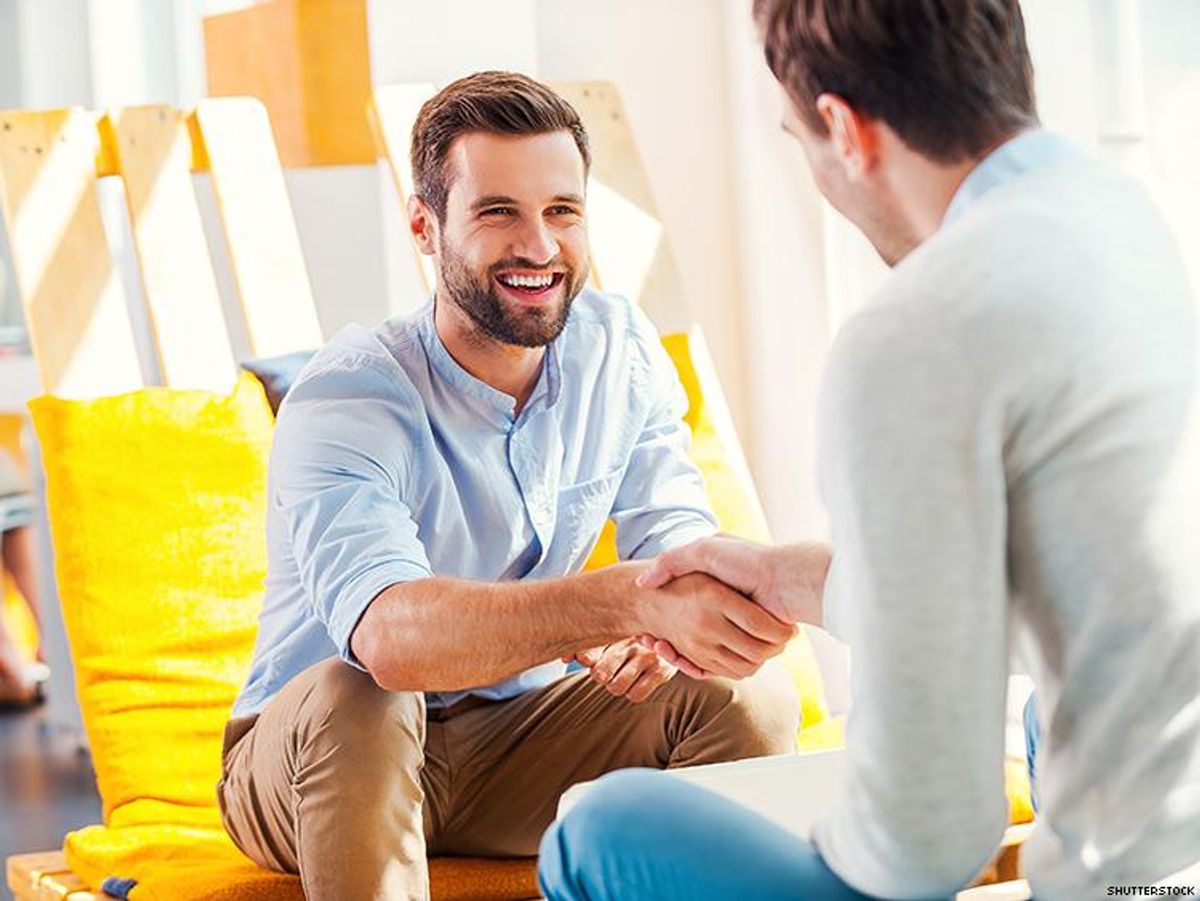A new report published today in Science finds that "conservative and conflicted voters" are less prone to act on their anti-LGBT biases after an in-depth, one-on-one conversation with canvassers who support equal rights, especially for transgender people.
The results of the study, piloted by Stanford University assistant professor David Broockman, and University of California, Berkeley, Ph.D. student Joshua Kalla, essentially affirm the efficacy of tactics developed by the Los Angeles LGBT Center called "deep canvassing."
Broockman and Kalla are the same team that debunked a similar study in 2015. Conducted by Michael LaCour and Donald P. Greena, the 2014 study found that a 20-minute conversation with a gay or lesbian canvasser could change someone's opinion on same-sex marriage.
"Our study's findings differ from the retracted one's in an important way," Kalla tells The Advocate. "We found that canvassers do not need to be members of an affected group to lastingly reduce prejudice against that group. Both transgender and nontransgender allies were effective at reducing prejudice against transgender people."
The new study analyzes methods developed by the L.A. LGBT Center called "deep canvassing," a practice quite different from typical door-to-door canvassing. To create a deeper impact, canvassers spend a longer time engaging in dialogue with the voters, taking 10-15 minutes to listen to the experiences of the voters and develop a two-way conversation rather than reading predetermined points.
"We send canvassers out with what we call a script, but more than containing talking points, it contains questions designed to be curious about voters and also steer the conversation toward real life experiences," Steve Deline, field organizer at the Los Angeles LGBT Center, tells The Advocate.
Playing on what psychologists call "analogic perspective-taking," canvassers relate to experiences of others as if they were their own, Deline explains. "So, in one sense, what the voter says and what the voter experiences is someway more important that our own experiences," he adds. "But the key is finding common ground, both [for] transgender canvassers and cisgender canvassers."
Some of these open-ended questions outlined in the deep canvassing script include:
Do you know anyone who is transgender?
If you do know someone, how do you know them?
How close are you?
How did you feel when you first met them?
"A really big part of it is about inviting them to think about their experiences or judgment," Deline adds. "[We ask them,] 'Have you ever been judged for who you are?'"
Broockman and Kalla found that deep canvassing can reduce the feelings of hate and prejudice in one out of 10 voters. To determine the impact, the researchers created a comparison between voters who were deeply canvassed about LGBT issues, compared to a randomly assigned control group of voters who were greeted with a conversation about recycling instead.
The randomized treatment group canvassed for LGBT issues also appeared to show a decline in anti-LGBT contempt as a whole, the researchers found.
To conduct the study, the L.A. LGBT Center's deep canvassing methods were employed by SAVE, a long-standing LGBT group based in Miami and serving South Florida. SAVE volunteers canvassed voters in the Miami region, hoping to build support for trans rights ahead of an anticipated ballot initiative that may try to repeal trans-inclusive nondiscrimination protections added to Miami-Dade county's human rights ordinance in December 2014.
"These conversations are a real game-changer for us here in Florida," says Tony Lima, executive director of SAVE. "Because of these conversations and their impact, we're getting closer to being the first state in the South to pass statewide protections for LGBT people."
"The neighborhoods [canvassers] were working in where historically [where] LGBT-inclusive ballot measures have done poorly," Broockman explains. "[They were] neighborhoods that have a track record of being more conservative on these issues. And in our data, what we find, at least in these neighborhoods, is that individuals who're more conservative and not as supportive were just as affected."
While it's important to consider the short-term nature of canvassing -- voters may adopt a new position initially, only to return to their preconceived notions as time goes by -- the researchers maintain that their study offers a powerful tool for LGBT advocates to impact voters, especially directly ahead of a contentious election.
"The bottom line is that we have new insight into how to reduce prejudice against transgender people," Fleischer says. "Considering the recent loss at the ballot box in Houston, the new anti-LGBT legislation in North Carolina, and the threat of future anti-LGBT ballot measures and bills, this study has real practical importance. We in the LGBT community and our allies can put ourselves in a better position to win if we start having deep-canvass conversations now, well in advance of a flash point."


















































































